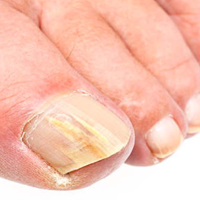Fungal nails
Prescribed oral medications from your GP or podiatrist can be used for fungal nails. These usually takes between three and six months to get rid of the infection but can take longer. Alternatively, over-the-counter remedies such as anti-fungal nail lacquer can be used. These can take up to a year or more to work as it takes this long for a nail to fully grow out .
How can I prevent it?
The most important tip for preventing athlete’s foot is to ensure your feet are completely dry after washing them and before you put your shoes and socks on. However, there are many things you can do to make your feet less hospitable to fungal infections.
- Firstly, change your footwear on a regular basis. There’s no point treating your feet if you constantly re-infect them by putting them into damp, fungally infected shoes. It takes 24-48 hours for shoes to dry out properly, so alternate your shoes daily
- If you really have to wear the same pair day after day (say, if you’re on holiday), dry them out by using a hairdryer on a cold setting; this will get rid of the perspiration quickly without creating more heat. To help shoes dry out more quickly, take any insoles out, loosen any laces and open your shoes out fully so that air can circulate. When buying, choose trainers with ventilation holes
- If your shoes are so tight that they squeeze your toes together, this allows moisture to gather between your toes and encourages fungus. Instead, let air circulate between the toes by choosing footwear with a wider, deeper toe box and choose shoes made from natural materials. Of course, you should also change your socks daily
- Wear flip-flops in the bathroom and in public showers. This will ensure that you don’t leave any shed skin for others to pick up, and it will also stop you picking up other species of fungus
- Finally, never wear anyone else’s footwear
When should I see a podiatrist?
Athlete’s foot is usually treatable at home, but a podiatrist may help you pinpoint the best treatment for your particular type of athlete’s foot. Your podiatrist can also help if the fungal infection has spread to your nails by reducing the thickness and cutting back the nails thereby exposing the infected nail bed to a lighter, cooler environment.
Nail infections can be treated with topical or oral medications. Oral medication can have side-effects so if you have other medical conditions or are on other medication, your GP or podiatrist may recommend that you don’t take it.
If you experience any foot care issues that do not resolve themselves naturally or through routine foot care within three weeks, it is recommended that you seek the help of a healthcare professional.
To talk to a podiatrist (also known as a chiropodist) about the options available regarding treatment, you can contact an NHS podiatrist or a private practice podiatrist. In both cases, always ensure that any practitioners you visit are registered with the Health and Care Professions Council (HCPC) and describe themselves as a podiatrist (or chiropodist).

